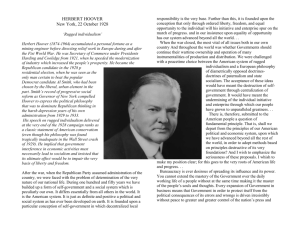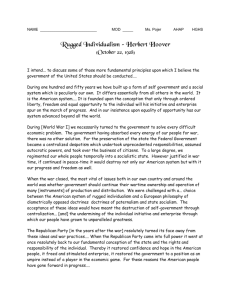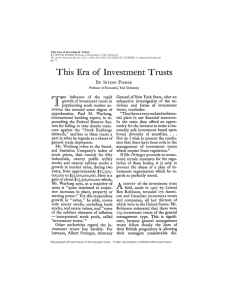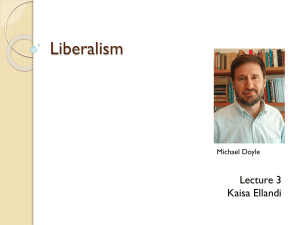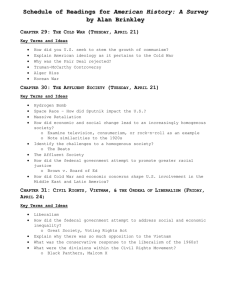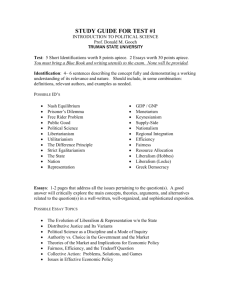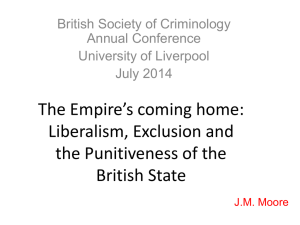The Modern World Begins Unit 2012-2013 - Lesson 13
advertisement
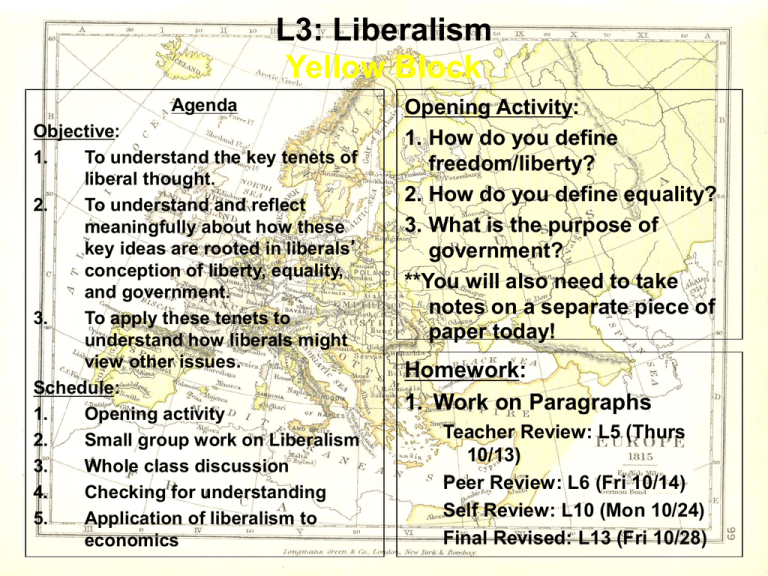
L3: Liberalism Yellow Block Agenda Objective: 1. To understand the key tenets of liberal thought. 2. To understand and reflect meaningfully about how these key ideas are rooted in liberals’ conception of liberty, equality, and government. 3. To apply these tenets to understand how liberals might view other issues. Schedule: 1. Opening activity 2. Small group work on Liberalism 3. Whole class discussion 4. Checking for understanding 5. Application of liberalism to economics Opening Activity: 1. How do you define freedom/liberty? 2. How do you define equality? 3. What is the purpose of government? **You will also need to take notes on a separate piece of paper today! Homework: 1. Work on Paragraphs Teacher Review: L5 (Thurs 10/13) Peer Review: L6 (Fri 10/14) Self Review: L10 (Mon 10/24) Final Revised: L13 (Fri 10/28) L13: Revolutionary Changes in Political Life: Liberalism Agenda Objective: 1.To understand the key tenets of liberal thought. 2.To understand and reflect meaningfully about how these key ideas are rooted in liberals’ conception of liberty, equality, and government. 3.To apply these tenets to understand how liberals might view other issues. Schedule: 1.What Do You Think? 2.Small group work on Liberalism 3.Whole class discussion 4.Application of liberalism to economics Homework: 1. Consult unit schedule. REMINDER: 1.Conservatism Reading Due Thurs 2. All HW Due Fri 3. Test on Fri! What Do You Think? • How do you define freedom/liberty? • How do you define equality? • What do you believe is the purpose of government? Introduction/ Historical Context Political Life Called Into Question After the End of the Dual Revolutions (1815) Industrial Revolution ~ Emergence of new socioeconomic structure French Revolution ~ Collapse of traditional aristocracy ~ Emergence of ideals of liberty, equality, and fraternity How would you describe life in 1815? The Dual Revolutions Lead to the Development of New Political Philosophies • Political Philosophy – Branch of philosophy that deals with fundamental questions about politics such as: • What is freedom/liberty? Is it important? • What is equality? Is it important? • What is the purpose of government? • Over the next two classes we will look at two political philosophies that emerged in the wake of the dual revolutions: – Liberalism – Conservatism Liberalism • Today we will explore the political philosophy of liberalism. • We will arrive at an understanding of its key beliefs/principles by exploring how liberals understand the concepts of liberty and equality and what they see as the purpose of government. • To guide us in the process we will engage with a classic liberal text, On Liberty, written by John Stuart Mill in 1859. The Tenets of Liberalism Developing & Refining Our Understanding of Liberalism • Group Work – Read the excerpts from On Liberty. – Discuss the following questions with your group: • How does Mill define liberty? • Why does Mill think freedom of speech is so important? What does this suggest about why he thinks liberty is important? • Given your understanding of how Mill views liberty, how do you think he understands equality? • What does Mill think is the purpose of government? • Whole Class Discussion Summarizing Liberalism Develop a slogan for liberalism! Applying What We Have Learned Enrichment Discussion • We have learned about the development of two economic systems in the wake of the Industrial Revolution: capitalism and communism. Which economic system do you think a classical liberal would endorse: capitalism or communism. Why?
